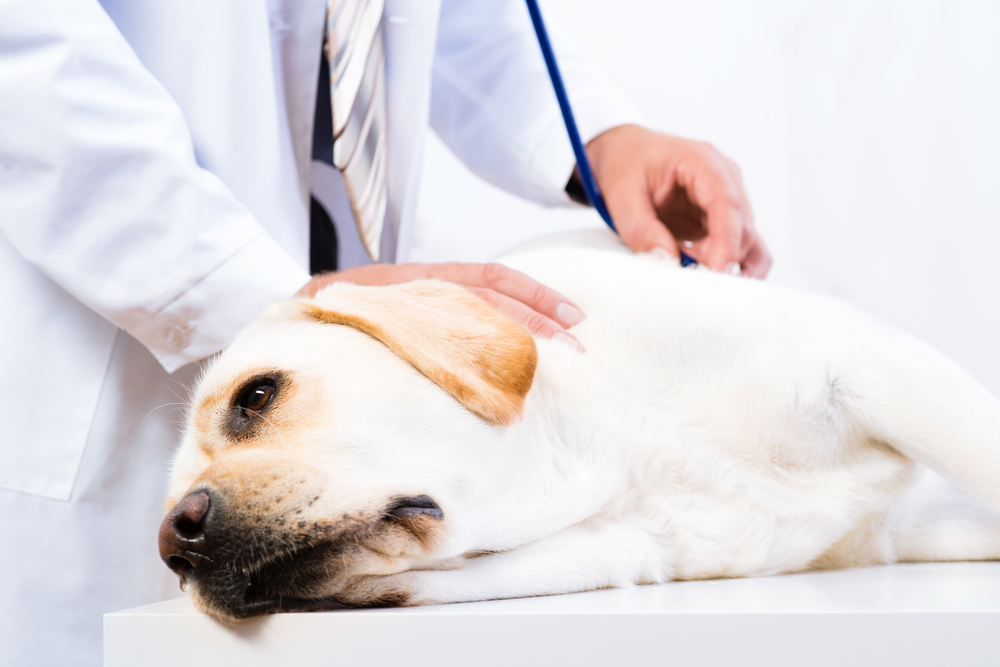Gastroenteritis In Dogs
Free Pet Insurance Comparison
Compare Quotes From Top Companies and Save
Secured with SHA-256 Encryption

Dr. Pippa Elliott BVMS, MRCVS
Veterinarian
Dr Pippa Elliott BVMS, MRCVS is a veterinarian with over 30 years of experience in companion animal practice. In 1987 she graduated from the University of Glasgow, with a degree in veterinary medicine and surgery. She works at Blythwood Vets and the People’s Dispensary for Sick Animals (PDSA). Pippa is an advocate of Fear-Free Practice, an animal addict, and a veterinary writer. She is also w...
Veterinarian
UPDATED: Feb 3, 2025
Pet Insurance U receives compensation from the third parties included on this site. This includes payment for clicks from our site to insurance providers’ sites and quote requests generated. Our rankings and reviews are not affected by payments from the insurance companies. The compensation we receive allows the site to be free and regularly updated. Our goal is to review every pet insurance provider, but not all companies are listed on the site.
And many of the companies we review do not pay us anything. We simply rate, compare and review their plan because we feel it will be valuable to you. Our reviews are guaranteed to be unbiased, professional and advertising compensation does not influence rankings.
We are a free online resource for anyone interested in learning more about pet insurance. Our goal is to be an objective, third-party resource for everything pet insurance related. We update our site regularly, and all content is reviewed by pet insurance experts.
UPDATED: Feb 3, 2025
Pet Insurance U receives compensation from the third parties included on this site. This includes payment for clicks from our site to insurance providers’ sites and quote requests generated. Our rankings and reviews are not affected by payments from the insurance companies. The compensation we receive allows the site to be free and regularly updated. Our goal is to review every pet insurance provider, but not all companies are listed on the site.
And many of the companies we review do not pay us anything. We simply rate, compare and review their plan because we feel it will be valuable to you. Our reviews are guaranteed to be unbiased, professional and advertising compensation does not influence rankings.
On This Page
Gastroenteritis is when your dog’s gastrointestinal tract is inflamed in and around the stomach and intestines.
Gastroenteritis usually causes abdominal discomfort or pain, diarrhea and/or vomiting in your dog.
Various microorganisms such as viruses and bacteria can cause gastroenteritis in dogs.
However, one of the most common causes of gastroenteritis in dogs is a viral infection, which can be complicated with bacteria or parasites.
Mild cases of gastroenteritis can be resolved with hydration and antibiotic therapy, but more severe cases require hospitalization.
Need Pet Insurance?
FACT: Pet insurance pays up to 90% of vet bills when your pet is sick or injured!
Common Symptoms

Some of the symptoms that are common in dogs with gastroenteritis
- Vomiting (sometimes with blood)
- Diarrhea (sometimes with blood) – sometimes 3 to 6 times a day
- Dehydration
- Depression
- Lethargy
- Lack of appetite
- Weight Loss
- Less active
- Low-grade fever
Related: 10 Things You Must Know Before You Buy Pet Insurance
Enter your ZIP code below to view companies that have cheap pet insurance rates.
Secured with SHA-256 Encryption
What Causes Gastroenteritis?
There are many different causes of gastroenteritis but they are generally caused by a bacteria or an infection:
- Viral infection (e.g. parvoviruses and coronaviruses)
- Dietary indiscretion
- Toxins
- Tumors
- Bacterial infection
- Parasitic infection
- Abdominal disorder
- Foreign bodies or other obstructions
- Poisonings
- Exocrine pancreatic insufficiency
- Addison’s disease
- Thyroid disease
Diagnosis
Gastroenteritis is usually diagnosed by the exclusion of other diseases.
Your vet will try to rule out the more serious causes that might have caused the symptoms of such as vomiting or diarrhea before they can diagnose the disease as gastroenteritis.
Your vet will first try to determine why your dog had any of the signs pointing to gastroenteritis.
Real Cost Savings from PetFirst Clients

Luna
PetFirst saved his parents
$6,712
A happy energetic Luna one morning couldn’t hold her food down. After months of multiple costly vet visits to specialists and an endoscopy, the problem was discovered and fixed. Luna put 22 pounds back on in no time and her parents were grateful for having PetFirst by their side to pay the bills.
Some important information that your vet will want to know about your dog:
- Your dog’s diet, how much your dog eats and how often
- Any supplements that have been given
- All illnesses in the last month
- Every food and drink that your dog has consumed within the last 48 hours
- Any exposure to pesticides, cleaning agents, medications
- Any new treats
- Exposure to a new dog or even a person
- Your dog’s history of vomiting and diarrhea and how it was treated
Now that your vet has your dog’s medical history, your vet will conduct a physical examination of your dog.
Your vet will determine if your dog has had abdominal pain, bloating, gas or any other swellings. Your dog’s temperature and vital signs will also be taken.
Depending on your vet’s findings, further testing might be recommended:
- Urinalysis: testing for kidney disease, urinary tract infection, glucose levels, diabetes, and dehydration.
- A complete blood cell count (CBC): to look for dehydration and infection.
- Radiographs and Ultrasounds of the abdomen: to see if there is a gastric or intestinal obstruction or any other abnormality.
- Serum electrolytes: to detect organ system abnormalities and/or any electrolyte imbalances as a result of diarrhea and vomiting.
After the diagnostic tests are finished and it is determined that gastroenteritis is the actual disease, treatment will be prescribed.
Treatment Options
Viral gastroenteritis is treated with supportive care because there are no available drugs to kill this type of viruses.
The first step of the treatment plan is restoring your dog’s normal fluid balance.
The idea is to re-hydrate your dog and restore your pup’s electrolyte balance.
Fluid therapy can be given orally if the dog is not vomiting. If your dog is vomiting, he or she will need to receive the therapy intravenously and is usually hospitalized.
Your dog’s veterinarian will need to run various diagnostic tests in order to determine which other drugs are needed such as:
Antibiotics will be given if there is a bacterial infection.
An anti-diarrheal might be administered after anatomical issues or any obstructions have been ruled out.
Food and even water might be limited during the start of the treatment and then later slowly re-introduced. This is very common with any vomiting or diarrhea.
Your vet will recommend the best diet for your dog during treatment.
Enter your ZIP code below to view companies that have cheap pet insurance rates.
Secured with SHA-256 Encryption
Can Pet Insurance Help with Gastroenteritis?
If you have already enrolled your dog in pet insurance, then you will be reimbursed up to 90% of the costs of all the testing and treatment.
The usual cost of treatment, depending on your vet’s findings can range from $500 to $1,500.
Of course, if you haven’t enrolled your dog in a pet insurance policy and your pup has already exhibited symptoms of gastroenteritis, then it will not be covered in the future should you decide to sign up for a policy.
As always, sign up for your dog while he or she is young and before any health issues have occurred.
Prognosis of Gastroenteritis
Most cases of gastroenteritis will improve greatly after re-hydrating your dog.
If the diarrhea and vomiting do not improve, then the diagnosis will need to be re-evaluated.
Gastroenteritis is a common health condition in dogs. The earlier you recognize the signs and treat your pup, the sooner your dog will feel better and get back to a normal condition.
If you think your dog doesn’t have gastroenteritis, but another health issue, our dog health glossary has a list of all the common issues that might occur in your dog.
Other articles you may find helpful:
Is Exotic Pet Insurance Necessary?
The Best Pet Insurance By State
Fun Facts, Dog FAQ, And Unsolicited Dog Advice
5 Training Commands to Save Your Dog’s Life
The Ultimate Guide to Safe Foods for Dogs
We get it, your dog is like your child and when your puppy or dog has health problems it is scary. Luckily there is pet insurance companies that will help you pay for any veterinarian care they made need. Checkout the best puppy and dog pet insurance companies and learn about common puppy health issues and ailments in older pets.
Common Health Problems:
Chronic Active Hepatitis in Dogs
Cruciate Ligament Tear in Dogs
Degenerative Myelopathy | Spinal Cord Disease In Dogs
Dementia in Dogs | Canine Cognitive Dysfunction
Dog Comedones (Schnauzer Bumps)
Dog Diarrhea: What Can You Do To Help?
Gallbladder Obstruction in Dogs
Heart Murmurs In Dogs | How To Identify Them
Intervertebral Disc Disease In Dogs
Nasal Solar Dermatitis In Dogs
Progressive Retinal Atrophy In Dogs
The Dog Flu – Symptoms & Treatment for Canine Influenza

Frequently Asked Questions
What is gastroenteritis in dogs?
Gastroenteritis is the inflammation of a dog’s gastrointestinal tract, including the stomach and intestines, leading to symptoms like abdominal discomfort, diarrhea, and vomiting.
What causes gastroenteritis in dogs?
Gastroenteritis in dogs can be caused by various microorganisms, such as viruses and bacteria. Viral infections are common, often complicated by bacteria or parasites.
How is gastroenteritis diagnosed in dogs?
Diagnosis is usually based on the exclusion of other diseases. Vets aim to rule out serious causes of symptoms like vomiting or diarrhea before confirming gastroenteritis.
What information will my vet need for the diagnosis?
Vets will inquire about your dog’s medical history, symptoms, and conduct a physical examination, including assessing signs like abdominal pain, bloating, and vital signs.
How is gastroenteritis in dogs treated?
Treatment involves restoring normal fluid balance through rehydration. In severe cases, hospitalization may be necessary. Supportive care, antibiotics for bacterial infections, and anti-diarrheal medications may also be prescribed.
Can pet insurance help with the costs of treating gastroenteritis?
Yes, if you have pet insurance, you may be reimbursed up to 90% of the costs for testing and treatment. Treatment costs can range from $500 to $1,500, depending on your vet’s findings.
Is it too late to get pet insurance if my dog already has gastroenteritis?
Yes, if your dog has already exhibited symptoms of gastroenteritis and you haven’t enrolled in pet insurance, the condition will not be covered if you decide to sign up for a policy later. It’s advisable to enroll your dog in insurance while they are young and healthy.
What is the prognosis for dogs with gastroenteritis?
Most cases of gastroenteritis improve significantly with rehydration. If symptoms persist, a re-evaluation of the diagnosis is needed. Early recognition and treatment contribute to a faster recovery.
Are there specific diets recommended during the treatment of gastroenteritis?
During treatment, food and water may be limited initially and gradually reintroduced. Vets will recommend the best diet for your dog based on their condition.
How can I find the best pet insurance for my dog?
You can compare quotes from top pet insurance companies to find the most suitable coverage for your dog’s needs. Pet insurance can help cover veterinary costs, including those related to gastroenteritis.
Enter your ZIP code below to view companies that have cheap pet insurance rates.
Secured with SHA-256 Encryption
Dr. Pippa Elliott BVMS, MRCVS
Veterinarian
Dr Pippa Elliott BVMS, MRCVS is a veterinarian with over 30 years of experience in companion animal practice. In 1987 she graduated from the University of Glasgow, with a degree in veterinary medicine and surgery. She works at Blythwood Vets and the People’s Dispensary for Sick Animals (PDSA). Pippa is an advocate of Fear-Free Practice, an animal addict, and a veterinary writer. She is also w...
Veterinarian
We are a free online resource for anyone interested in learning more about pet insurance. Our goal is to be an objective, third-party resource for everything pet insurance related. We update our site regularly, and all content is reviewed by pet insurance experts.
